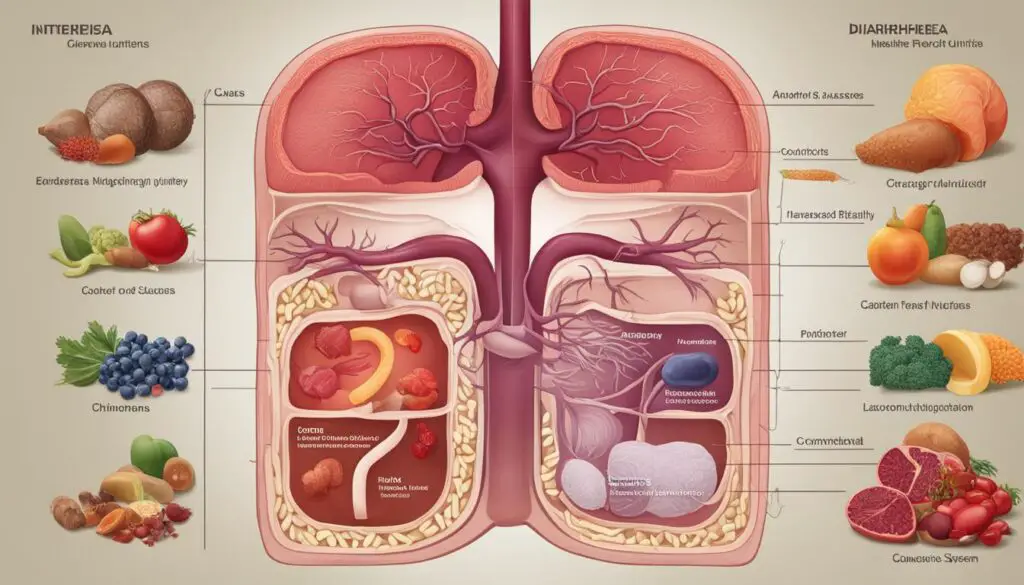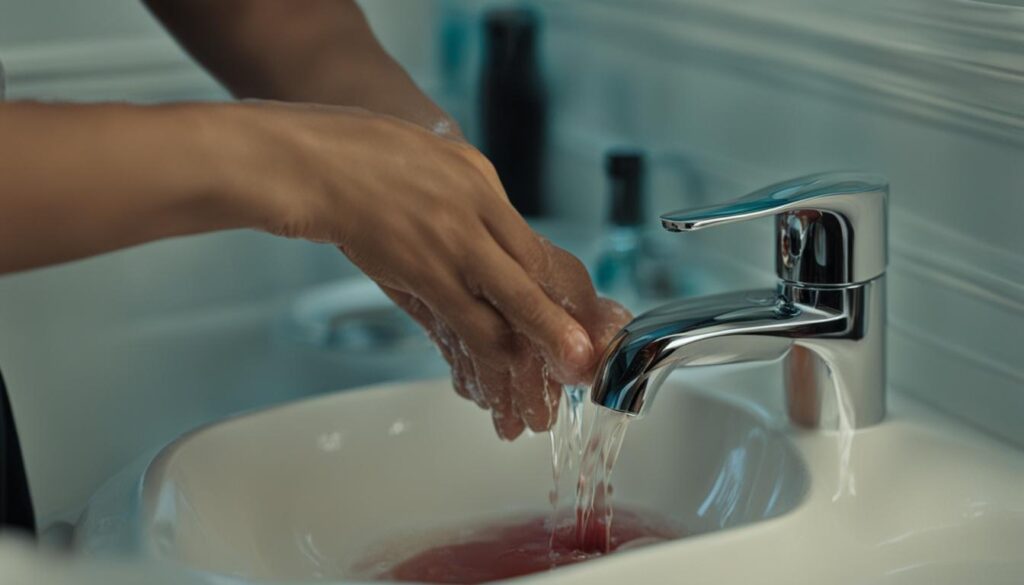Are you wondering why that bowl of soup you enjoyed is causing you digestive distress? If you experience diarrhea after consuming soup, you’re not alone. This article will explore the reasons behind soup-induced diarrhea, common causes, and how to prevent it from happening.
Soup is a popular comfort food enjoyed by many, but it can sometimes lead to unpleasant gastrointestinal symptoms. Understanding why soup can cause diarrhea is essential in finding relief and making necessary dietary changes.
Key Takeaways
- Soup-induced diarrhea can occur due to various factors such as infections, food intolerances, and gastrointestinal conditions
- Common causes of acute diarrhea after eating include food poisoning, viral gastroenteritis, and lactose intolerance
- Chronic diarrhea after eating can be attributed to conditions like irritable bowel syndrome, inflammatory bowel disease, and celiac disease
- Home care for diarrhea includes staying hydrated, following a bland diet, and practicing proper hand hygiene
- Preventing diarrhea after eating involves practicing good hygiene, following proper food safety measures, and avoiding trigger foods
Common Causes of Acute Diarrhea After Eating
Acute diarrhea that occurs shortly after eating can have various causes. Understanding these causes can help in proper management and prevention of this uncomfortable condition.
1. Food Poisoning
Food poisoning, often caused by contaminated food or water, can lead to diarrhea and other gastrointestinal symptoms. Common pathogens like Salmonella, E. coli, and Campylobacter are responsible for foodborne illnesses.
2. Viral Gastroenteritis
Viral gastroenteritis, also known as the stomach flu, is a common cause of acute diarrhea and vomiting. Viruses such as norovirus and rotavirus can spread through contaminated food or water, leading to gastrointestinal distress.
3. Lactose Intolerance
Lactose intolerance, the inability to digest lactose found in dairy products, can result in diarrhea after consuming foods like milk, cheese, or ice cream. The body lacks an enzyme called lactase, which is essential for breaking down lactose.
4. Infection
Infections caused by bacteria, parasites, or other pathogens can trigger acute diarrhea after eating. These infections can be contracted through contaminated food, water, or inadequate hand hygiene.
5. Gastrocolic Reflex
The gastrocolic reflex, a normal bodily response, stimulates bowel movements shortly after eating. In some individuals, this reflex can be intensified, leading to acute diarrhea after meals.
6. Toddler’s Diarrhea
Toddler’s diarrhea is a condition that primarily affects young children. It is characterized by recurrent episodes of watery diarrhea after eating certain foods, such as fruits, juices, or high-sugar snacks.
7. Antibiotics
Antibiotics can disrupt the natural balance of bacteria in the gut, leading to diarrhea as a side effect. This type of diarrhea is known as antibiotic-associated diarrhea.
Other potential causes of acute diarrhea after eating include parasites, certain medications, and underlying medical conditions. Identifying the specific cause can guide appropriate treatment and preventive measures.
| Causes of Acute Diarrhea | Main Symptoms |
|---|---|
| Food Poisoning | Diarrhea, nausea, vomiting, abdominal pain |
| Viral Gastroenteritis | Diarrhea, vomiting, fever, stomach cramps |
| Lactose Intolerance | Diarrhea, gas, bloating |
| Infection | Diarrhea, fever, abdominal pain |
| Gastrocolic Reflex | Diarrhea shortly after eating |
| Toddler’s Diarrhea | Chronic watery diarrhea in young children |
| Antibiotics | Diarrhea as a side effect of medication |
Common Causes of Chronic Diarrhea After Eating
Chronic diarrhea is defined as persistent loose or watery stools that last for at least 4 weeks after eating. There are several underlying causes that can contribute to this condition, resulting in ongoing discomfort and disruption to daily life.
One common cause of chronic diarrhea after eating is irritable bowel syndrome (IBS). IBS is a gastrointestinal disorder characterized by a range of symptoms, including diarrhea, bloating, and abdominal pain. It is believed to be caused by a combination of factors, such as abnormal contractions of the intestinal muscles, heightened sensitivity to certain foods, and an imbalance of gut bacteria.
Inflammatory bowel disease (IBD) is another possible cause of chronic diarrhea after eating. This umbrella term encompasses conditions like Crohn’s disease and ulcerative colitis, which cause chronic inflammation in the digestive tract. Apart from diarrhea, individuals with IBD may also experience weight loss, fatigue, and abdominal cramps.
Celiac disease is an autoimmune disorder triggered by consuming gluten, a protein found in wheat, barley, and rye. When individuals with celiac disease consume gluten-containing foods, the immune system mistakenly attacks the lining of the small intestine. This damages the intestine’s ability to absorb nutrients and can result in chronic diarrhea, among other symptoms.
Other potential causes of chronic diarrhea after eating include endocrine disorders and malabsorption. Endocrine disorders, such as hyperthyroidism, can disrupt the normal functioning of the digestive system and lead to diarrhea. Malabsorption refers to the improper absorption of nutrients by the small intestine, which can be caused by conditions like pancreatic insufficiency or bile acid malabsorption.
It is important to consult with a healthcare professional if you experience chronic diarrhea after eating to determine the underlying cause and develop an appropriate treatment plan.

Home Care and Treatment for Diarrhea After Eating
When it comes to managing diarrhea after eating, home care and treatment are essential. By following these practices, you can alleviate symptoms, promote hydration, and support your digestive system’s recovery.
Hydration
One of the key aspects of managing diarrhea is staying hydrated. Excessive fluid loss can lead to dehydration, so it’s crucial to replenish lost fluids. Try drinking:
- Electrolyte-replacement solutions
- Watered-down apple juice
- Ginger ale
- Soup broth
Diet for Diarrhea
Choosing the right foods can make a significant difference in diarrhea management. Incorporate these bland, easy-to-digest options into your diet:
- Bananas
- Rice
- Soup
- Crackers
- Plain oatmeal
Proper Hand Hygiene
Preventing the spread of germs is crucial in managing diarrhea. Practice proper hand hygiene by washing your hands frequently with soap and water. This simple habit can help minimize the risk of infection and further illness.
Over-the-Counter Medications
“Over-the-counter medications can provide relief by reducing the frequency of loose stools. However, it’s important to consult with a healthcare professional before using these medications, especially if you have underlying health conditions or are taking other medications.”
Consider these over-the-counter options:
- Loperamide
- Diphenoxylate-atropine
- Bismuth subsalicylate
Recommended Diets for Chronic Conditions
For individuals with chronic conditions such as inflammatory bowel disease (IBD), irritable bowel syndrome (IBS), or celiac disease, it is crucial to adhere to recommended diets provided by healthcare professionals. These tailored diets can effectively manage symptoms and promote overall well-being.
By implementing these home care practices and treatment methods, you can effectively manage diarrhea after eating and promote a healthy digestive system.
| Treatment | Benefits |
|---|---|
| Hydration | Prevents dehydration and replenishes lost fluids |
| Diet for Diarrhea | Supports easy digestion and helps harden stools |
| Proper Hand Hygiene | Prevents the spread of germs and reduces infection risk |
| Over-the-Counter Medications | Reduces the frequency of loose stools |
| Recommended Diets for Chronic Conditions | Manages symptoms and promotes overall well-being |
Prevention of Diarrhea After Eating
Preventing diarrhea after eating is crucial for maintaining good health and well-being. By practicing good hygiene and food safety measures, you can significantly reduce the risk of diarrhea. Here are some essential tips to help you prevent diarrhea and enjoy a healthy digestive system:
- Hand Hygiene: One of the most effective ways to prevent the spread of germs that cause diarrhea is by practicing proper hand hygiene. Remember to wash your hands thoroughly with soap and water for at least 20 seconds before and after handling food, using the bathroom, or coming into contact with potentially contaminated surfaces. If soap and water are not readily available, you can use an alcohol-based hand sanitizer.
- Rotavirus Vaccine: To prevent viral gastroenteritis, particularly in young children, it is essential to ensure they receive the rotavirus vaccine. Consult with your healthcare provider to ensure your child is up to date with their vaccinations.
- Food Preparation: Proper food preparation is paramount in reducing the risk of food poisoning, a common cause of diarrhea. Follow these guidelines:
- Always cook foods, especially meats, thoroughly to kill any harmful bacteria or parasites.
- Wash fruits and vegetables under running water to remove any dirt or potential contaminants.
- Drink purified water and avoid consuming untreated or contaminated water.
- Avoid consuming raw or undercooked eggs and seafood.
- Store foods properly, separating raw meats from cooked foods to prevent cross-contamination.
- Refrigerate leftovers promptly to prevent bacterial growth.
- Food Intolerances and Allergies: If you have known food intolerances or allergies, it is vital to avoid triggering foods that can lead to diarrhea. Identify your intolerances or allergens and read food labels carefully. Additionally, consider consulting with a healthcare professional or registered dietitian for guidance on managing your specific dietary needs.
By incorporating these preventive measures into your daily routine, you can reduce the incidence of diarrhea after eating and promote a healthier digestive system.

Conclusion
Diarrhea after eating can be a distressing and disruptive symptom that can be caused by various factors, such as infections, food intolerances, and gastrointestinal conditions. To effectively manage and prevent soup-induced diarrhea, it is important to understand the underlying cause and make necessary dietary and lifestyle changes.
Practicing good hygiene, including frequent handwashing, can help reduce the spread of germs that cause diarrhea. Following proper food safety measures, such as consuming well-cooked foods and avoiding contaminated food, can also play a crucial role in preventing diarrhea after eating.
If experiencing persistent or severe diarrhea after eating, seeking medical attention is important. Healthcare professionals can provide guidance on managing symptoms and may recommend specific treatments or dietary adjustments based on the individual’s condition.
By understanding the causes and taking proactive steps to prevent diarrhea after eating, individuals can effectively manage their symptoms and improve their overall well-being. Incorporating these preventive measures into daily routines can help reduce the occurrence of diarrhea and promote better digestive health.
FAQ
Why does soup give me diarrhea?
Soup can give you diarrhea due to various reasons, including food poisoning, viral gastroenteritis, or food intolerances. It is important to identify the underlying cause and make necessary dietary and lifestyle changes to prevent soup-induced diarrhea.
What are the common causes of acute diarrhea after eating?
Acute diarrhea after eating can be caused by factors such as food poisoning, viral gastroenteritis, lactose intolerance, infection, gastrocolic reflex, toddler’s diarrhea, antibiotics, or parasites.
What are the common causes of chronic diarrhea after eating?
Chronic diarrhea after eating can be attributed to underlying conditions like irritable bowel syndrome (IBS), inflammatory bowel disease (IBD), celiac disease, endocrine disorders, or malabsorption.
How can I manage diarrhea after eating at home?
To manage diarrhea after eating at home, it is important to stay hydrated by drinking fluids like electrolyte-replacement solutions and soup broth. Consuming bland foods like bananas, rice, soup, crackers, and plain oatmeal can also be helpful. Over-the-counter medications like loperamide, diphenoxylate-atropine, and bismuth subsalicylate can reduce the frequency of loose stools.
How can I prevent diarrhea after eating?
Preventing diarrhea after eating involves practicing good hygiene and food safety measures. Hand washing with soap and water or using an alcohol-based hand sanitizer is essential. Proper food preparation, consuming well-cooked foods, drinking purified water, and avoiding contaminated food can also reduce the risk. The rotavirus vaccine can help prevent viral gastroenteritis in young children.
